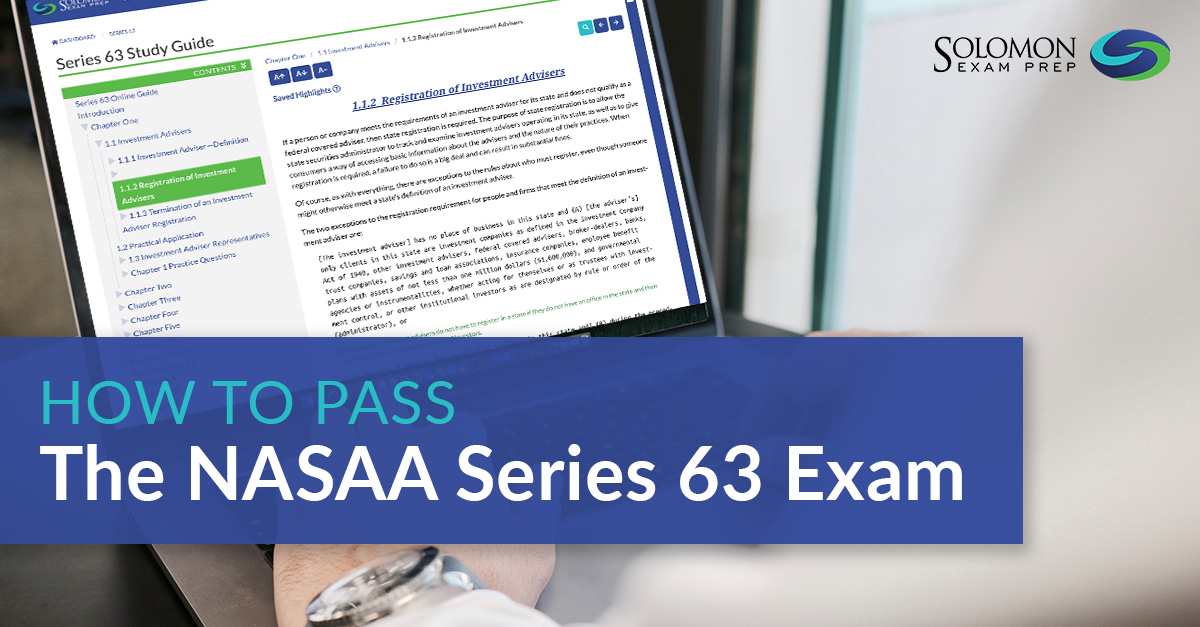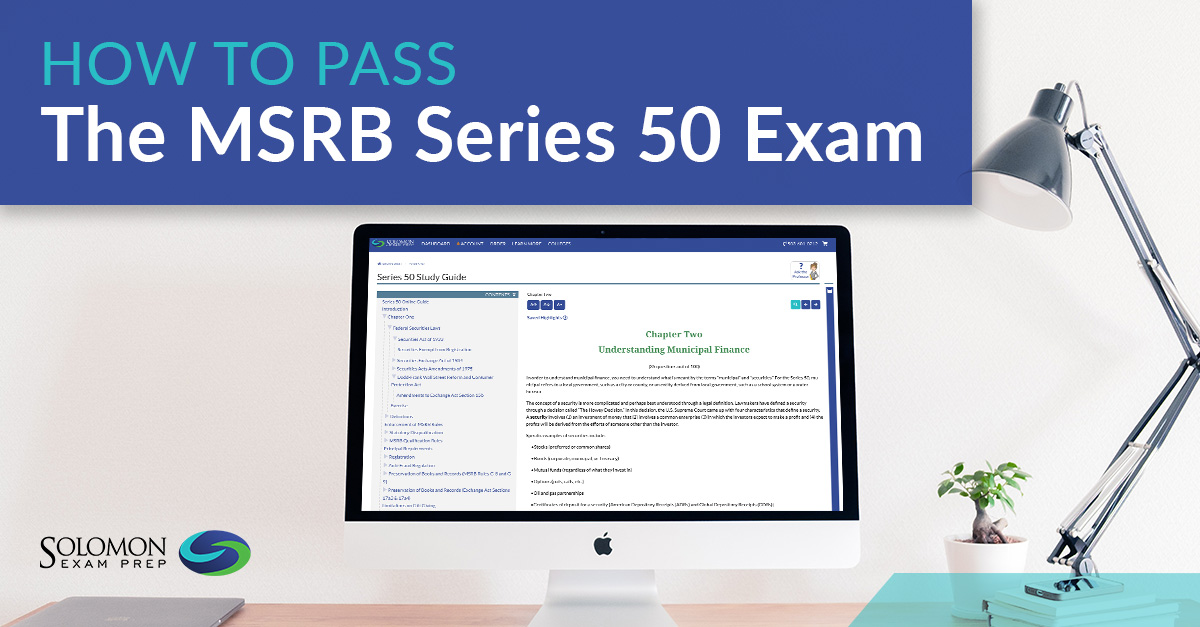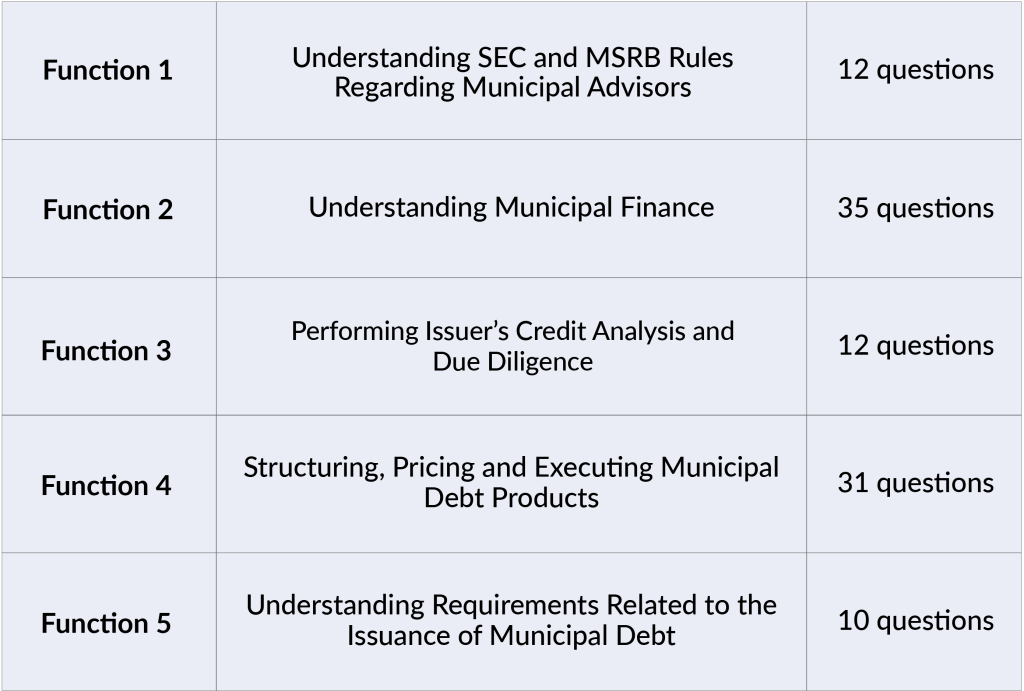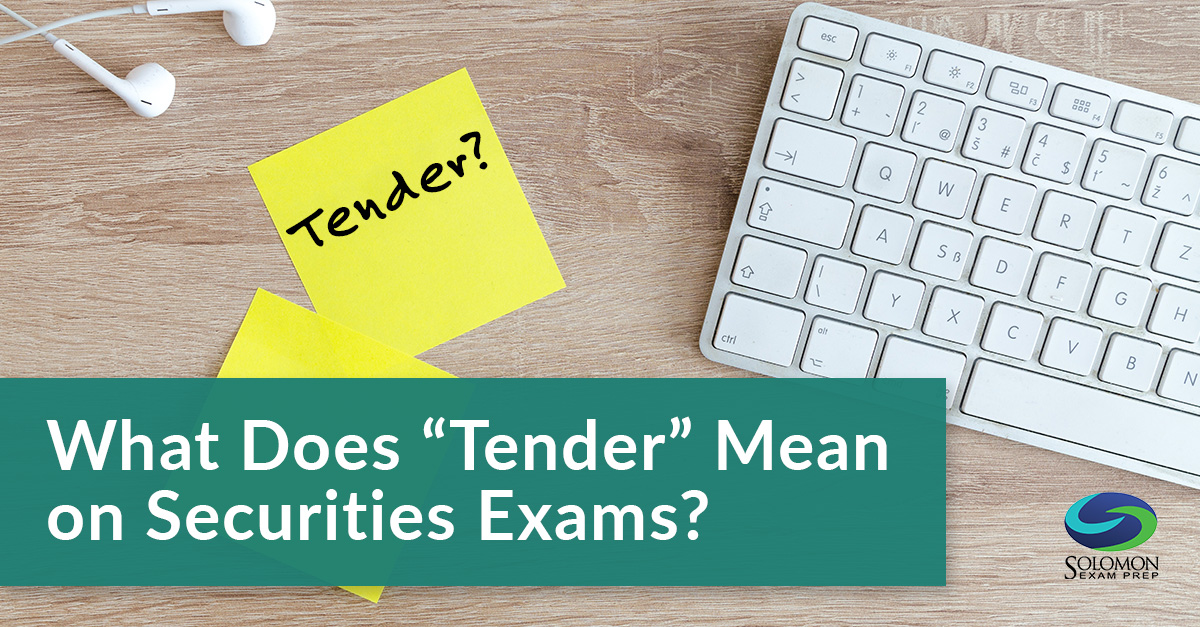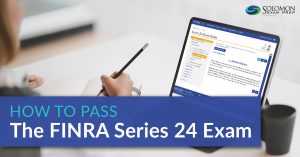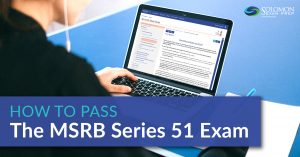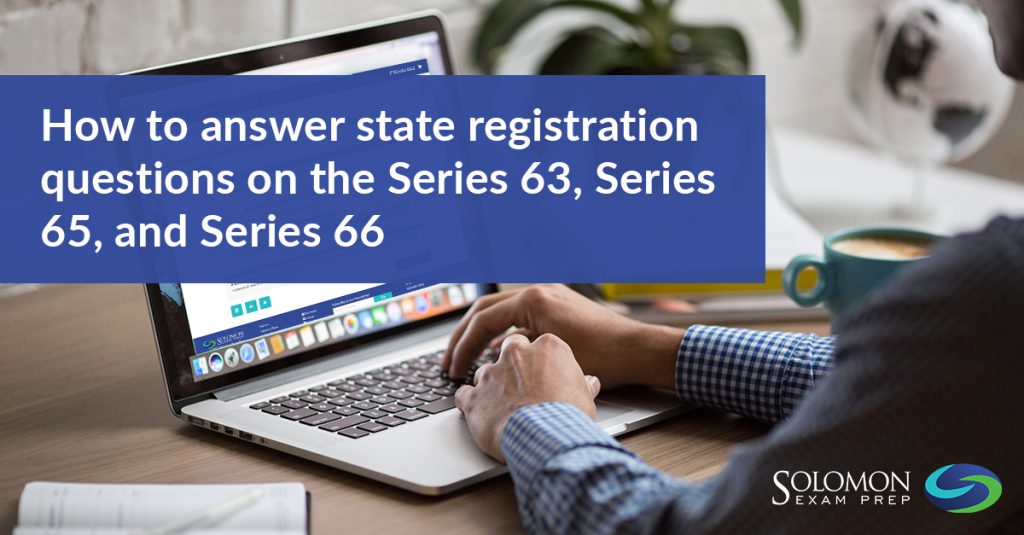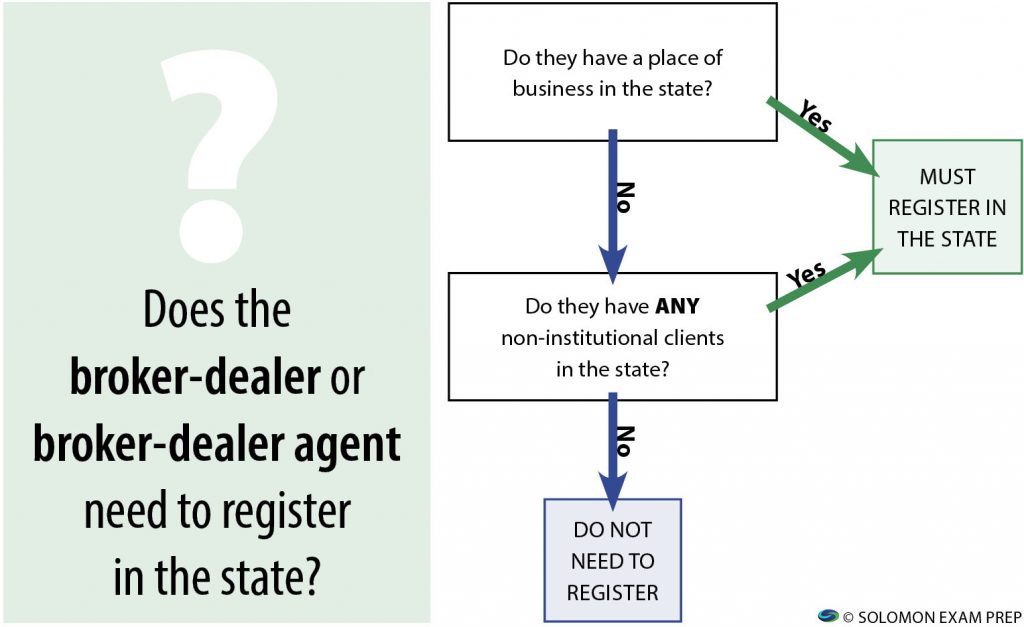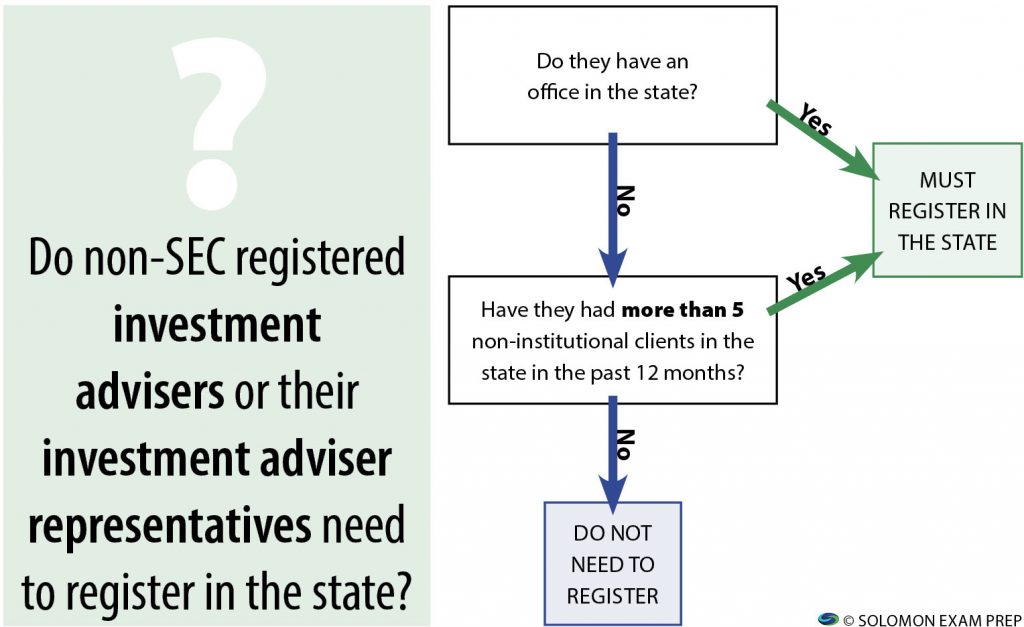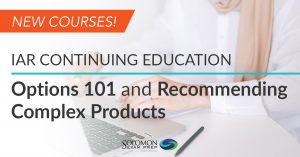The Series 63, also known as the Uniform Securities Agent State Law Exam, is the state law test for broker-dealer representatives. Passing the Series 63 is required by most U.S. states if you want to register in a state as a registered representative. However, to be fully registered, you may also need to pass the FINRA Securities Industry Essentials (SIE) exam and the Series 6, 7, 22, 52, 79, 82, or 99. For example, if you plan to sell securities for a broker-dealer, you must pass the Series 6 or 7 (plus the co-requisite SIE) in addition to the Series 63.
The Series 63, Series 65, and Series 66 exams were all created by NASAA, which represents state securities regulators in the U.S., Canada, and Mexico. The goal of NASAA is to protect and educate investors to promote the integrity of financial markets. In terms of content, there is a fair amount of overlap between the exams, but each one qualifies individuals a bit differently.
What’s the difference between the Series 63, Series 65, and Series 66 exams?
Of the three exams, the Series 63 is the shortest, at 65 questions. The Series 63 exam covers the registration of persons and securities under the Uniform Securities Act and ethics in the securities industry. As mentioned above, passing the Series 63 permits you to sell securities in a particular state, but you must also pass a FINRA exam (often the Series 6 or 7) in order to become fully registered. For instance, if you pass the Series 6 and Series 63, you are qualified to become a financial adviser or insurance agent who also sells mutual funds and works at a brokerage, investment firm, bank, or insurance company. On the other hand, with the Series 7 and Series 63, you can work as a stockbroker at a brokerage, investment firm, or bank.
If you want to register as an investment adviser representative (IAR), you will need to pass the Series 65 or 66, depending on the state. Some states allow registered brokerage representatives to act as IARs. In these states, if you’ve passed the Series 7, then the 66 will qualify you to become a licensed IAR. If you have NOT passed the Series 7 and want to become an IAR, then you’ll need to take the Series 65 exam. The Series 65 exam contains much of the same information as the Series 7, and it also tests your knowledge of the state laws governing investment advisers. The Series 66 does not cover much of the information from the Series 7, but it does test your knowledge of state laws governing investment advisers. As result, the Series 66 is shorter than the Series 65 (100 questions compared to 130).
If you’re not sure whether you need to pass the Series 63, 65, or 66 for a particular state, check with the state regulator for specific requirements. This page on the NASAA website lists contact information for all state regulators.
About the Exam
The Series 63 exam consists of 60 scored and 5 unscored multiple-choice questions covering the eight topic areas of the Series 63 Content Outline. The 5 additional unscored questions are ones that the exam committee is trying out. These are unidentified and are distributed randomly throughout the exam.

Note: Scores are rounded down to the next lowest whole number (e.g. 71.9% would be a final score of 71% – not a passing score for the Series 63 exam).
Topics Covered on the Exam
The questions on the Series 63 exam cover the following content areas, as determined by NASAA:
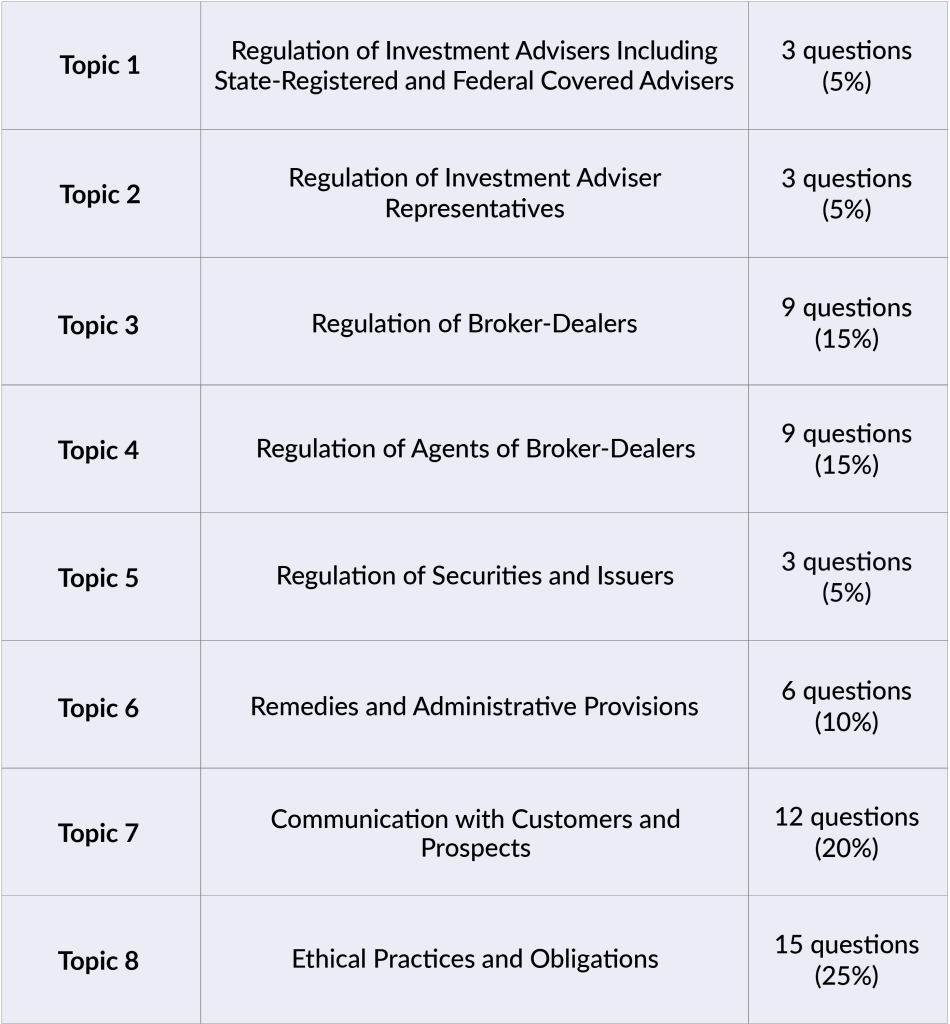
NASAA updates its exam questions regularly to reflect the most current rules and regulations. Solomon recommends that you print out the current version of the NASAA Series 63 Content Outline and use it in conjunction with the Solomon Series 63 Study Guide. The Content Outline is subject to change without notice, so make sure you have the most recent version.
Question Types on the Exam
The Series 63 exam consists of multiple-choice questions, each with four options. You will see these question structures:
Closed Stem Format:
This item type asks a question and gives four possible answers from which to choose.
Typically, how long must an investment adviser keep records?
-
- Three years
- Five years
- Six years
- For the lifetime of the firm
Incomplete Sentence Format:
This kind of question has an incomplete sentence followed by four options that present possible conclusions.
A broker-dealer registered in one state whose only office is located in that state does not need to register in another state if it has:
-
- Less than $50,000,000 in assets
- Over $100,000,000 in assets
- No non-institutional clients in that state
- Five or fewer non-institutional clients in that state
“EXCEPT” Format:
This type requires you to recognize the one choice that is an exception among the four answer choices presented.
All of the following are exempt from registration under the Investment Advisers Act of 1940 except:
-
- A broker-dealer that charges a fee for investment advice
- A publisher that charges a fee to write a column about investments
- A lawyer that gives investment advice as part of overseeing a client’s estate
- A teacher who is paid to teach a class that offers instruction on how to construct a portfolio
Complex Multiple-Choice (“Roman Numeral”) Format:
For this question type, you see a question followed by two or more statements identified by Roman numerals. The four answer choices represent combinations of these statements. You must select the combination that best answers the question.
Which of the following are types of orders issued by an administrator?
-
- Stop order
- Cease and desist order
- Resume order
- Criminal order
-
- I only
- II only
- I and II
- III and IV
Answers: 1. B 2. C 3. A 4. C
For an even better idea of the possible question types you might encounter on the Series 63 exam, try Solomon Exam Prep’s free Series 63 Sample Quiz.
Taking the Series 63 Exam
The Series 63 exam is administered by FINRA and can be taken at a Prometric test center or remotely online using Prometric’s ProProctor system. If taking the exam at a test center, you will be given a dry erase pen and whiteboard or a pen and scratch paper, and a basic electronic calculator. You cannot bring notes, paper, or your own calculator. Phones and watches are not permitted either. Due to COVID-19, you are required to wear a mask the whole time you are at the test center. Solomon recommends taking timed practice exams in the Series 63 Exam Simulator while wearing a mask to get used to this added discomfort.
If you’re thinking about taking the test from the comfort of your own home or office with ProProctor, it’s important to be aware of the strict procedures you must follow. See this user guide for complete details. And for a first-hand account of the remote testing experience, read this Solomon blog post.
Test-Taking Tips
Whether you take the exam in person or online, it helps to keep some test-taking strategies in mind. Don’t spend too long on one question—this may cause you to run out of time and not get to other questions you know. If you don’t know the answer to a question, guess at the answer and “flag” it. There is no penalty for guessing, so it is beneficial to answer every question.
After you have finished all the questions, you can come back to any flagged questions. Not only does this strategy allow you to efficiently answer the ones you know, but it can also help because you might learn something later in the exam that may help you answer an earlier question. Just remember to save enough time to return to the questions you didn’t answer. However, it is not a good idea to simply skip all of the difficult questions with the intention of answering them later. You should make a serious effort to answer each question before moving on to the next one, as your thoughts are often clearer early on in the exam-taking process than they will be later.
How to Study for the Series 63 Exam
Follow Solomon Exam Prep’s proven study system:
-
- Read and understand. Read the Solomon Study Guide, carefully. The Series 63 is a knowledge test, not an IQ test. Many students read the Study Guide two or three times before taking the exam. To increase your ability to focus while reading, or as an alternative to reading, listen to the Series 63 Audiobook, which is a word-for-word reading of the Study Guide.
- Answer practice questions in the Exam Simulator. When you’re done with a chapter in the Study Guide, take 4–6 chapter quizzes in the Solomon Exam Simulator. Use these quizzes to give yourself practice and to find out what you need to study more. Make sure you read and understand the question rationales. When you’re finished reading the entire Study Guide, review your handwritten notes once more. Then, and only then, start taking full practice exams in the Exam Simulator. Aim to pass at least six full practice exams and try to get your Solomon Pass Probability score to at least an 80%; when you reach that point, you are probably ready to sit for the Series 63 exam.
Use these effective study strategies:
-
- Take handwritten notes. As you read the Study Guide, take handwritten notes and review your notes every day for 10 to 15 minutes. Studies show that the act of taking handwritten notes in your own words and then reviewing them strengthens learning and memory.
- Make flashcards. Making your own flashcards is another powerful and proven method to reinforce memory and strengthen learning. Solomon also offers digital flashcards for the Series 63 exam.
- Research. Research anything you do not understand. Curiosity = learning. Students who take responsibility for their own learning by researching anything they do not understand get a deeper understanding of the subject matter and are much more likely to pass.
- Become the teacher. Studies show that explaining what you are learning greatly increases your understanding of the material. Ask someone in your life to listen and ask questions. If you don’t have anyone, explain it to yourself. Studies show that helps almost as much as explaining to an actual person (see Solomon’s previous blog post to learn more about this strategy!).
Take advantage of Solomon’s supplemental tools and resources:
-
- Use all the resources. The Series 63 Resources folder in your Solomon student account has helpful study tools, including documents that summarize important exam concepts. There is also a detailed study schedule that you can print out – or use the online study schedule and check off tasks as you complete them.
- Watch the Video Lecture. This provides a helpful review of the key concepts in each chapter after reading the Solomon Study Guide. Take notes to help yourself stay focused.
-
Good practices while studying:
- Take regular breaks. Studies show that if you are studying for an exam, taking regular walks in a park or natural setting significantly improves scores. Walks in urban areas or among people did not improve test scores.
- Get enough sleep during the period when you are studying. Sleep consolidates learning into memory, studies show. Be good to yourself while you are studying for the Series 63: exercise, eat well, and avoid activities that will hurt your ability to get a good night’s sleep.
You can pass the NASAA Series 63 Exam! It just takes focus and determination. Solomon Exam Prep is here to support you on your path to becoming qualified to sell securities within a state!
Explore all Solomon Exam Prep Series 63 study materials, including the Study Guide, Exam Simulator, Audiobook, Video Lecture and Flashcards.
Looking for more support as you prepare for the Series 63 exam? Solomon offers Live Web Classes for the Series 63.
For more helpful securities exam-related content, study tips, industry updates, and promotional offers sent directly to your inbox, join the Solomon email list. Just click the button below:

